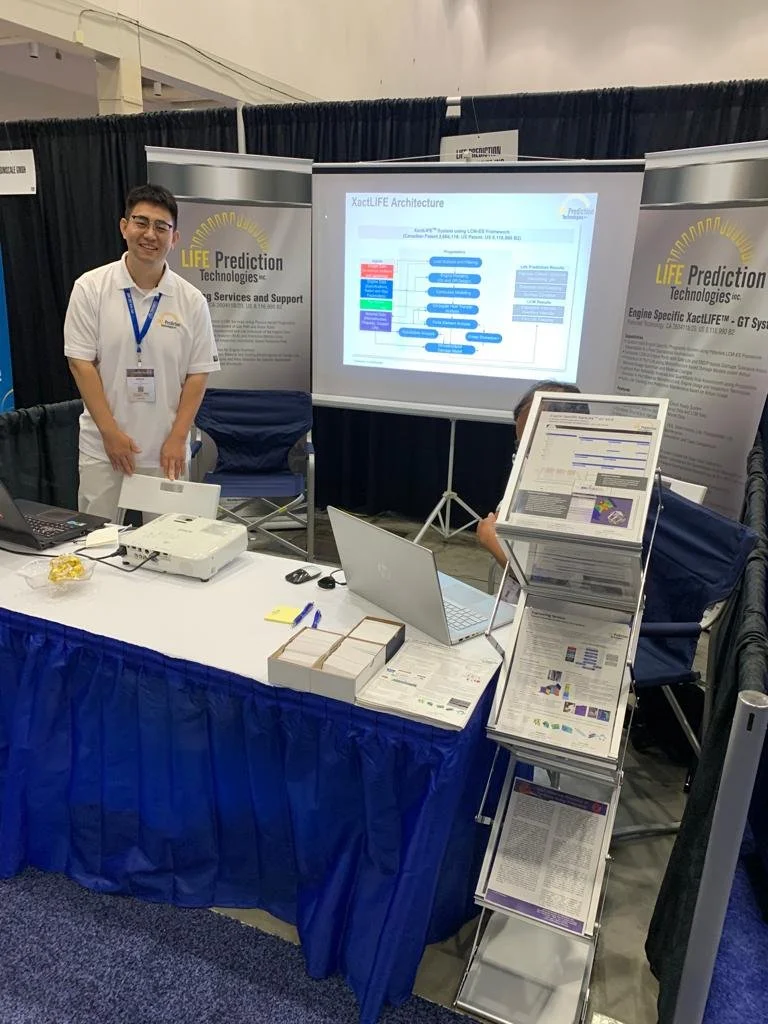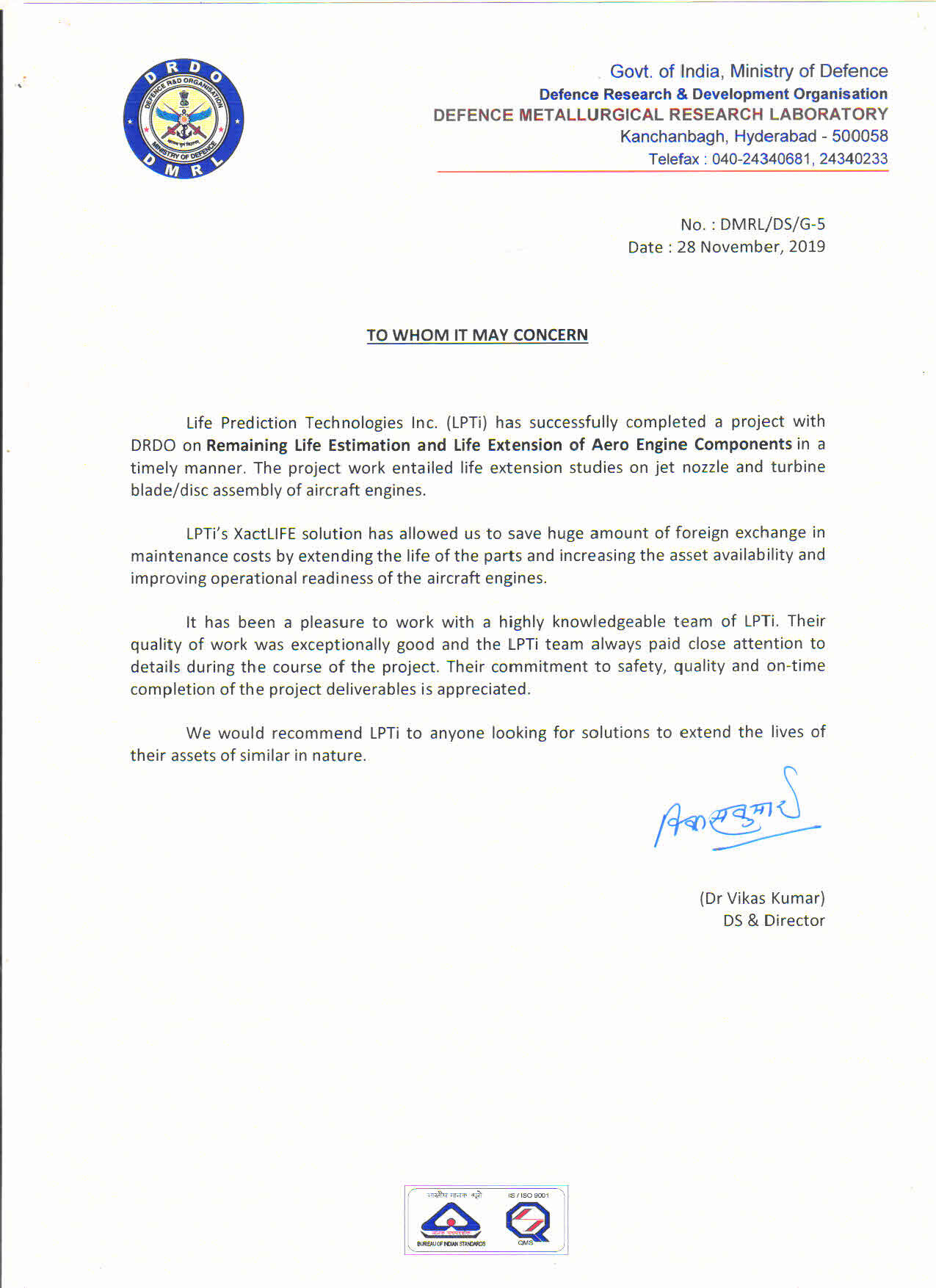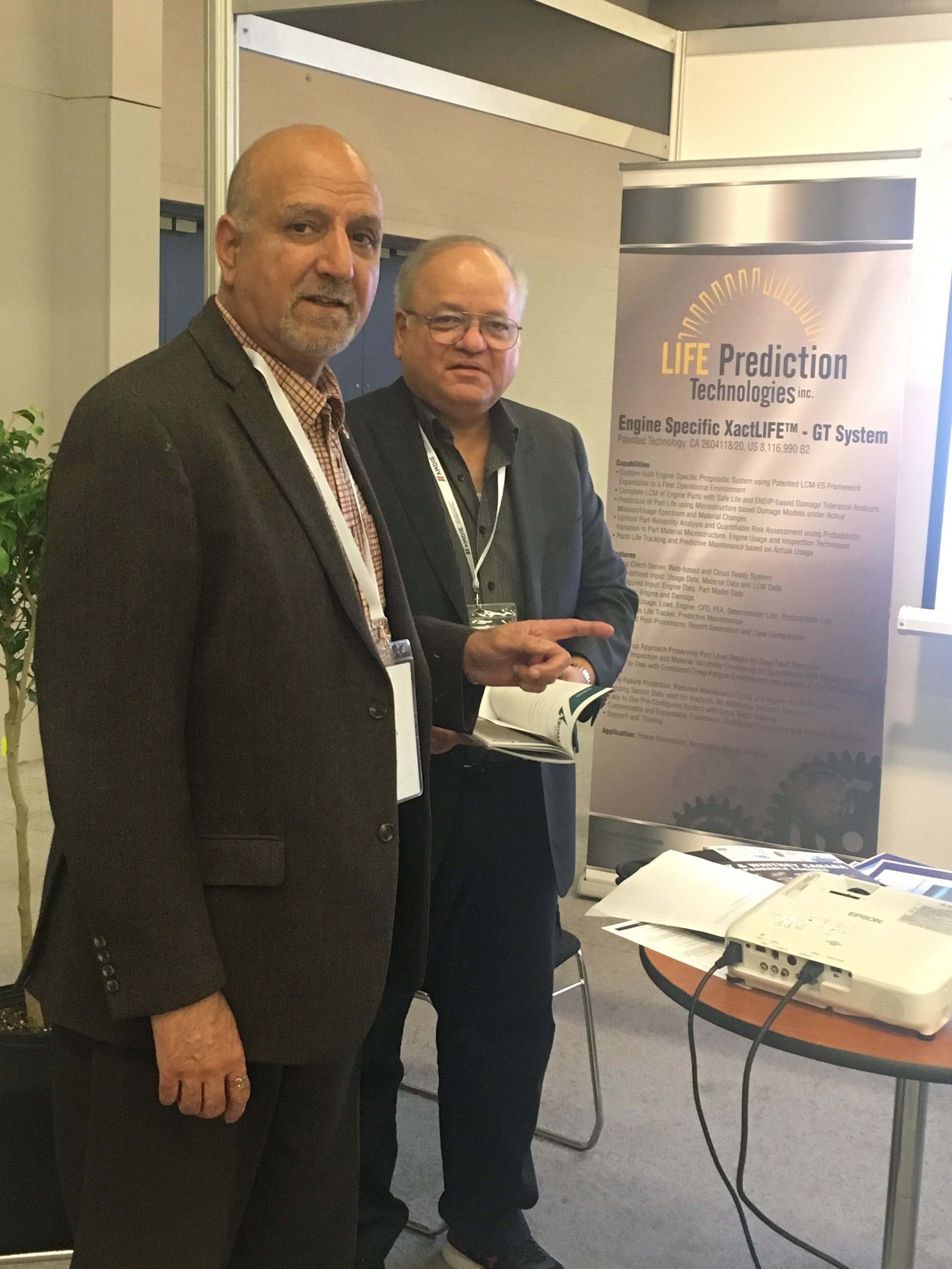LPTi participated in Turbo Expo 2023 exhibit and conference in Boston held between 26th to 30th June 2023. LPTi's XactLIFE predictive maintenance product and engineering services capabilities were well received by the turbine OEM and user communities. Dr. Koul of LPTi also gave a lecture on "Service Induced Damage in Gas Turbine Parts" as a part of the tutorial session on Metallurgy for Non-Metallurgists organized by the 3M Committee
Turbo Expo 2021
Dr. Koul of LPTi delivered an invited presentation on the Service Behavior of Gas Turbine Components as part of a workshop entitled Metallurgy for Non-metallurgists during Turbo Expo 2021
Panel Presentation NTPC, INDIA
Life Prediction Technologies Inc was invited by NTPC India to make a panel presentation on “Digital Twin Technology for Gas Turbines” during their Global Power meet held at Raipur on Feb 13-14 2020.
SHIPT Tech Forum 2020
Life Prediction Technology made a presentation on Digital Twin for Gas Turbines at SHIP Tech Forum 2020 held at Ottawa on Feb 25, 2020.
what our customers say about us…
Turbo Expo 2019
LPTi made a panel presentation on “Advances in Digital Twin Technology for Gas Turbines” during Turbo Expo 2019 in Phoenix Arizona. Turbo Expo is recognized as the must-attend event for turbomachinery professionals working in the turbine industry. The technical conference has a well-earned reputation for bringing together the best and brightest experts from around the world to share the latest in turbine technology, research, development, and application.
CANSEC 2019
LPTi will be exhibiting at CANSEC 2019 from May 29-30, Ottawa. We will be very happy to see you visit our booth 229 to know more about our Model based Digital twin platform for gas turbine parts.
Aeromart Montreal 2019
LPTi demonstrated its Digital Twin platform in recently concluded Aeromart Montreal Show 2019.
Aero India 2019 Air Show
LPTi was invited to make a presentation on “Digital Twins for Aero Engines – An Emerging Technology” during the 2 day symposium on “Emerging Aerospace Technologies” on Feb 18-19, 2019 as part of the Aero India 2019 Air Show
ASM Canada Council John Convey Innovation Award
LPTi was awarded the 2018 ASM Canada Council John Convey Innovation Award for Development and Demonstration of Material Physics Based Digital Twin and a Predictive Maintenance System for Gas Turbines (XactLIFE).
LPTi has developed world’s first predictive maintenance system for gas turbine components that considers the physics of damage accumulation arising due to creep, fatigue, thermal-mechanical fatigue and environmental loads as a function of actual engine usage at the microstructural level in each component to precisely predict their fracture critical locations and remaining useful life. The novel damage and fracture modeling approach of combining deformation kinetics and deformation mechanism theories is used to quantitatively consider the effects of material microstructure on damage accumulation rates and damage progression as a function of actual engine usage. Furthermore, materials engineering rules have also been developed and implemented to take into account the effects of the sequence of cyclic and steady state loads on damage accumulation rates and its progression. This damage modeling approach further considers the variability in the microstructure to perform probabilistic computations to predict the reliability of parts upfront rather than waiting for failure data from the field to accumulate to make such predictions. This software platform thus allows engine users and MROs to cost effectively maintain the engine fleets, optimize parts usage and provide operational readiness in the field. This technology has been qualified and implemented in the field with several aero engine and land based turbine users.
LPTi is an SME located in Ottawa Canada, offers customized predictive maintenance products and services to gas turbine life cycle managers and MROs. The patented XactLIFE framework enables engine usage based quantitative assessment of damage evolution in each critical engine part and provides additional intelligence to OEMs maintenance recommendations. Component design changes can also be assessed.
LPTi Exhibiting at CANSEC 2018 (Booth # 229)
LPTi Attending MRO Americas 2018 - Booth # 2661
LPTi @ PHM Society 2017, St Petersburg, FL
LPTi is attending and co-sponsoring the 2017 PHM Society conference at St Petersburg. Avi will be providing the following presentations
· A technical paper on data analytics for gas turbine, Effect of Ambient Temperature on Performance of Gas Turbine, Paper Session 6A, Wednesday, October 4, 10:30 – 12:00, Room: St. Petersburg 2
· Technology Demonstration: Model-based Predictive Maintenance Solution for Specific Turbine, Wednesday, October 4, 3:30 to 5:00pm, Room: Williams & Demens
Looking forward to catching up, meeting and discussing how LPTi’s engineering services and product could benefit critical asset owners, overhauler and operators to reduce maintenance cost and risk.
Thank you for your interest @ Turbo Expo 2017
Avi Banerjee, Ajay Tiku, Ashok Koul and Tony Jarrett (Left to Right) @ Turbo Expo 2017, Charlotte, NC
LPTi would like to thank the participants of Turbo Expo 2017 in Charlotte for stopping by our booth, showing interest in our engineering services and products, and for taking the time to watch a demo of our digital twin of a gas turbine – XactLIFE GT. We would also like to thank all the attendees of our paper presentation by Anthony Jarrett on June 29th, titled “Validation of a Gas Turbine Thermodynamic Model Without Accurate Component Maps”, authored by Anthony Jarrett and Ying Chen.
We thoroughly enjoyed the many interactions that we had with the members of the academia, various research institutes, OEMs, system integrators, testing and simulation specialists, MROs and users. We got to know the varied challenges facing the gas turbine industry and discussed how LPTi could become part of a comprehensive solution. We also got valuable feedback and comments on our XactLIFE GT product.
We look forward to continuing the interesting discussions that we had in Turbo Expo 2017 participants and seek opportunities for partnering, collaborating and providing support and solutions to the gas turbine community at large.
LPTi at Exhibition | Turbo Expo, 2017
LPTi will have a booth (#1208) at the Exhibition | Turbo Expo 2017, Charlotte, NC, June 27-29. During the exposition, LPTi will be demonstrating the PHM platform - XactLIFE and show how to reduce ownership cost while managing risk of using service exposed engine components. The demonstration will be targeted for users, maintenance, repair and overhaul companies, third party part manufacturers and emerging OEMs in the aerospace, aviation, power generation, oil and gas and marine sectors. The demonstrations will show how the actual usage is used for predicting crack nucleation and propagation life of failure and durability critical engine components. It will also cover predictive maintenance intervals and associate cost as well as elements of parts life tracking. The capability of analyzing uncertainties in the life prediction for up front quantification of the risk will also be demonstrated.
The visitors shall get to know the underlying PHM technologies, how to better utilize the available data for usage based life prediction and make more informed decision-making with custom-built maintenance management.
Moreover LPTi would like the opportunity to know the visitors, understand their design, operational and maintenance challenges, and offer customized solutions from a range of engineering consulting services.
Looking forward to meeting you at Turbo Expo, 2017.
Announcing our presentation at the 2017 ASME Turbo Expo Conference
Anthony Jarrett will be presenting a paper at the 2017 ASME Turbo Expo Conference (Charlotte, North Carolina) on June 29th. The paper describes one of the modules of LPTi's XactLIFE system, and is titled Validation of a Gas Turbine Thermodynamic Model Without Accurate Component Maps, authored by Anthony Jarrett and Ying Chen.
The abstract is reproduced below. Find us at the conference to hear all the details!
The authors have developed an engine performance model for use within a physics-based analysis tool to predict gas turbine engine life. The model employs a multivariate optimization method to solve the gas turbine thermodynamic equations, and incorporates a calibration phase to capture the behavior of individual engines without requiring accurate component maps.
To validate this approach, a database of test cell data for a turboprop engine has been used. The data consists of approximately 80 engine tests; each one with five operating points. Using a cross-validation method, each engine was uniquely calibrated using four of the operating points, and then validated using parameters from the fifth operating point. To benchmark the calibration process, these analyses were repeated without the calibration stage.
The un-calibrated outputs showed a lack of both precision and accuracy, due to imprecision in the component maps, and variation from engine to engine. In contrast, the calibrated outputs of compressor discharge temperature (CDT), compressor discharge pressure (CDP), and turbine inlet temperature (TIT) were predicted within 1% error for more than 95% of all cases.
Although most of the key thermodynamic parameters were predicted accurately, we have found that the shaft power calculation demonstrates some significant deviations from the test cell data. This has been attributed to the formulation of the turboprop thermodynamic model, and ongoing work is attempting to mitigate this issue. This understanding of the characteristic engine algorithms will provide valuable guidance in selecting suitable engine parameters as inputs and references.










